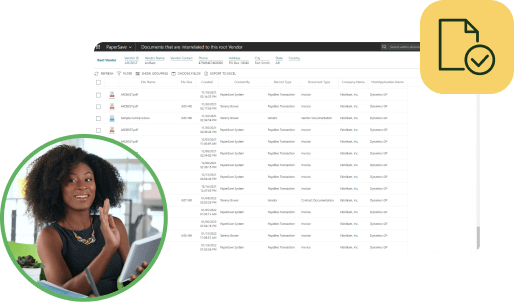
Salim Khalife
Salim Khalife founded Paramount Workplace, now a subsidiary of PairSoft. He currently uses his decades of SaaS experience in the consulting space and is based out of Michigan with his family.
View all posts by Salim KhalifeSalim Khalife

One of the most significant advantages of the right document management for finance teams is the substantial time savings it offers. Traditional paper-based processes are not only cumbersome but also prone to errors. Document management systems (DMS) enable finance professionals to digitize and automate various workflows such as data entry, invoice processing, and expense reporting. This automation not only reduces the risk of errors but also frees up valuable time that finance teams can allocate to more strategic business processes like financial analysis and planning.
Consider invoice processing, for example. With a document management solution in place, incoming invoices can be scanned with OCR (optical character recognition), automatically categorized, and routed to the appropriate team members for approval, all through their ERP. This automation significantly reduces the time required to process invoices and minimizes the chances of human error, leading to quicker payment cycles and improved vendor relationships — no filing cabinets necessary.
Finance teams often need to collaborate with colleagues across different departments and locations. Document management systems provide a centralized repository for all financial documents and file types, making it easy for team members to access, share, and collaborate on critical financial information. Whether it’s sharing financial reports, budget data, or compliance documents, DMS ensures that the right people have access to the right information at the right time.
Moreover, one of the key features that cloud-based DMS solutions enable is remote access, allowing finance professionals to work from anywhere with an internet connection versus relying on on-premise access. This flexibility is particularly valuable during times of remote work or when finance teams need to access financial data while on the go. It also ensures that critical financial information is never locked within the confines of a physical office.
Finance teams deal with sensitive financial data that must be protected against unauthorized access and data breaches, which is ideally done through the digitization of paper-based documents. Document management systems come equipped with robust security features that help finance teams maintain data integrity and compliance with regulations such as GDPR, HIPAA, and SOX. These features include access controls, encryption, audit trails, document versioning, and automated data retention policies.
Access controls allow finance teams to define permissions for who can access, view, edit, and delete financial documents, ensuring that sensitive information is only accessible to authorized stakeholders and that previous versions can be viewed. Encryption safeguards data both in transit and at rest, making it nearly impossible for malicious actors to intercept or compromise financial information. Audit trails provide a detailed record of all document activities, enabling finance teams to track changes, access history, and maintain transparency.
Automated data retention policies help finance teams comply with legal and regulatory requirements by automatically archiving or deleting documents according to predefined schedules. This reduces the risk of accidentally retaining sensitive information past its required retention period, which could result in legal consequences.
In finance, quick and accurate retrieval of financial documents is crucial. Document management systems offer advanced search functionality that allows finance professionals to find the electronic documents they need within seconds. These systems employ user-friendly metadata, full-text search, and indexing to make documents easily searchable, even if they are stored in a vast repository of digital assets.
Imagine a scenario where a finance team needs to retrieve an invoice from several years ago for a tax audit. With electronic document management, they can simply enter relevant keywords or search criteria, and the system will quickly locate the document in real-time, saving hours or even days of manual searching through physical files or disorganized digital folders.
Document management not only improves operational efficiency but also leads to cost savings for finance teams. By reducing the need for physical storage space, printing, and manual document handling, DMS solutions help finance departments cut down on expenses associated with paper-based processes. Additionally, the automation of routine tasks leads to reduced labor costs and fewer errors, which can result in significant financial benefits over time.
Furthermore, adopting a digital document management approach aligns with sustainability goals by reducing paper consumption and minimizing the environmental impact associated with printing and physical document storage. Many organizations are increasingly prioritizing sustainability, and implementing a DMS can contribute to these efforts.
Document management systems are not limited to document storage and retrieval; they can also play a crucial role in data analytics and informed decision-making. Finance teams can leverage DMS to collect and analyze financial data more effectively, providing insights that support strategic planning and forecasting.
For example, a DMS can include workflow automation to automatically capture and categorize financial data from invoices, expense reports, and financial statements. This data can then be used to generate reports, track spending trends, and identify areas where cost savings can be realized. Finance teams can also use DMS analytics to assess vendor performance, evaluate investment opportunities, and make data-driven decisions that positively impact the organization’s financial health.
In an era of digital transformation, finance teams cannot afford to rely on outdated paper-based processes. Implementing a document management system brings a multitude of benefits to finance departments, including enhanced efficiency, collaboration, security, information management, compliance, and cost savings. By embracing document management, finance teams can position themselves as strategic partners within their organizations, driving better decision-making and contributing to overall financial success.
Get a demo today to learn how PairSoft’s document management and automation solutions can keep your business growing alongside your ERP.
Automated workflows empower your team to focus on larger, more complex initiatives without having to think about small processes.



